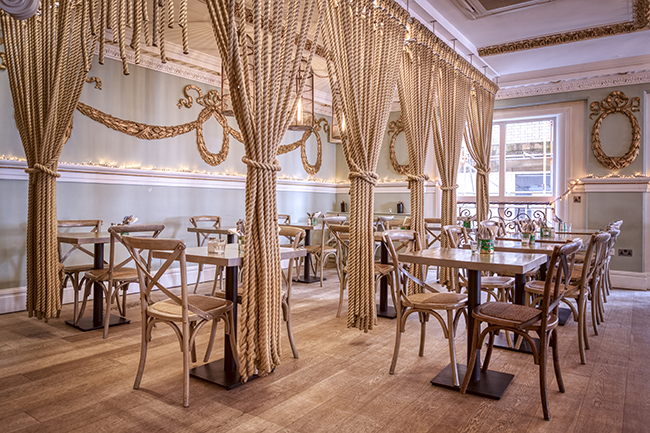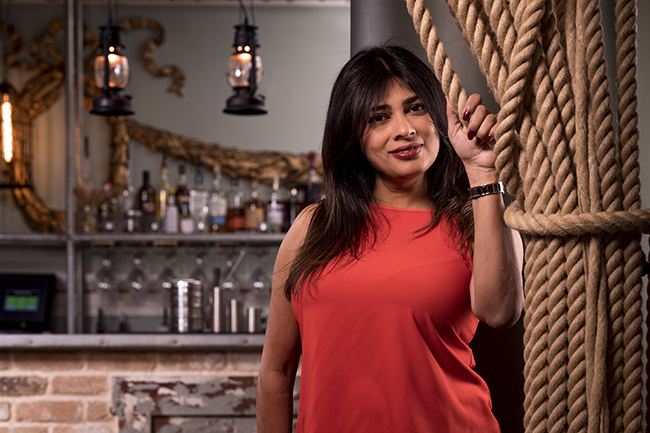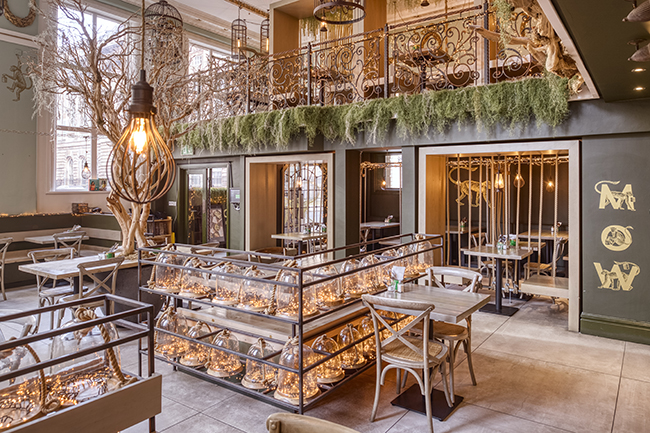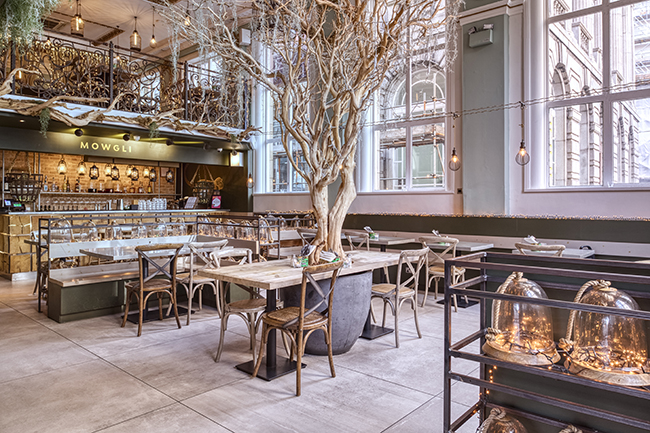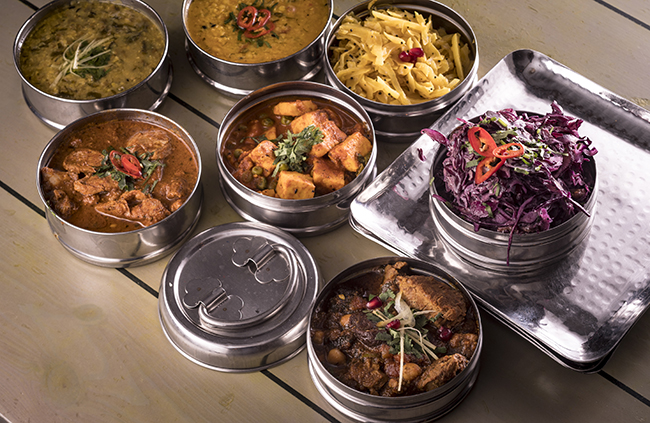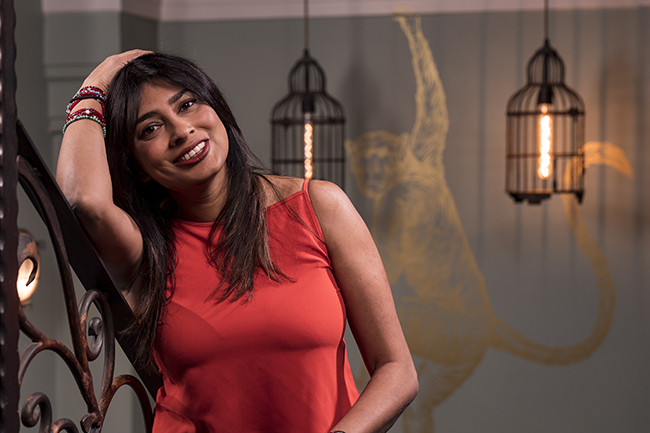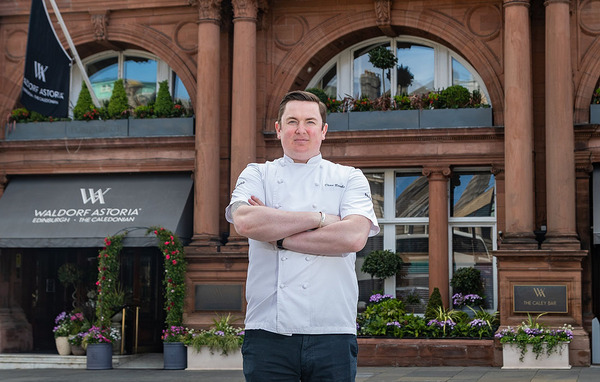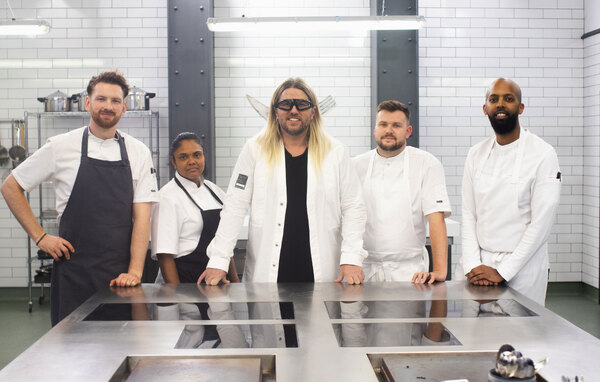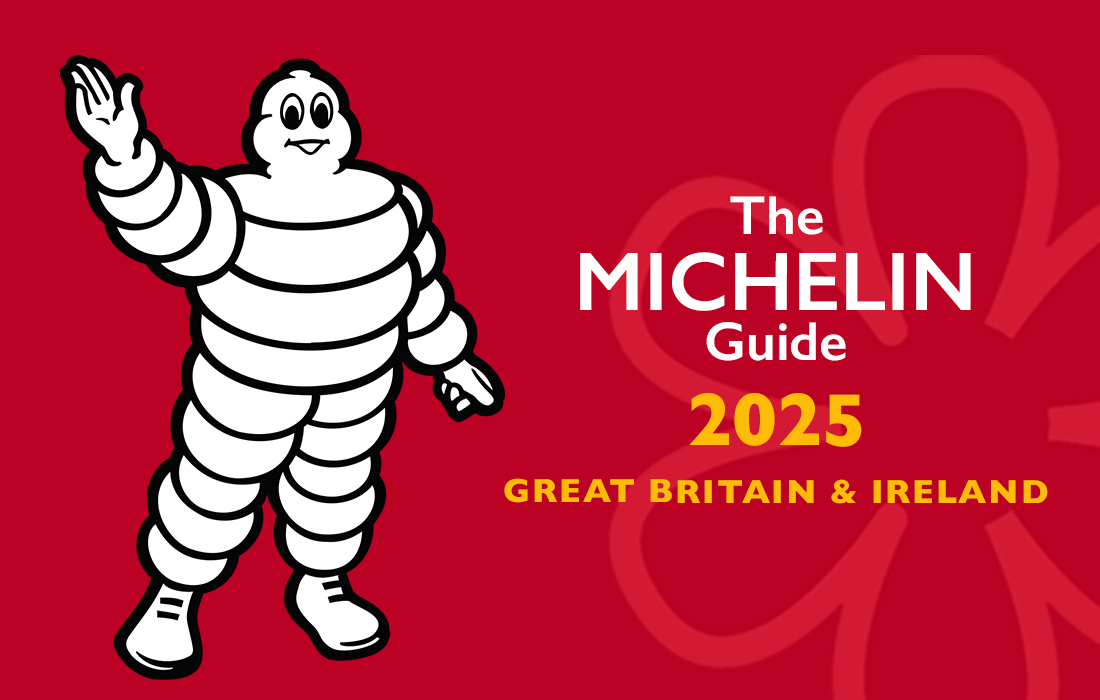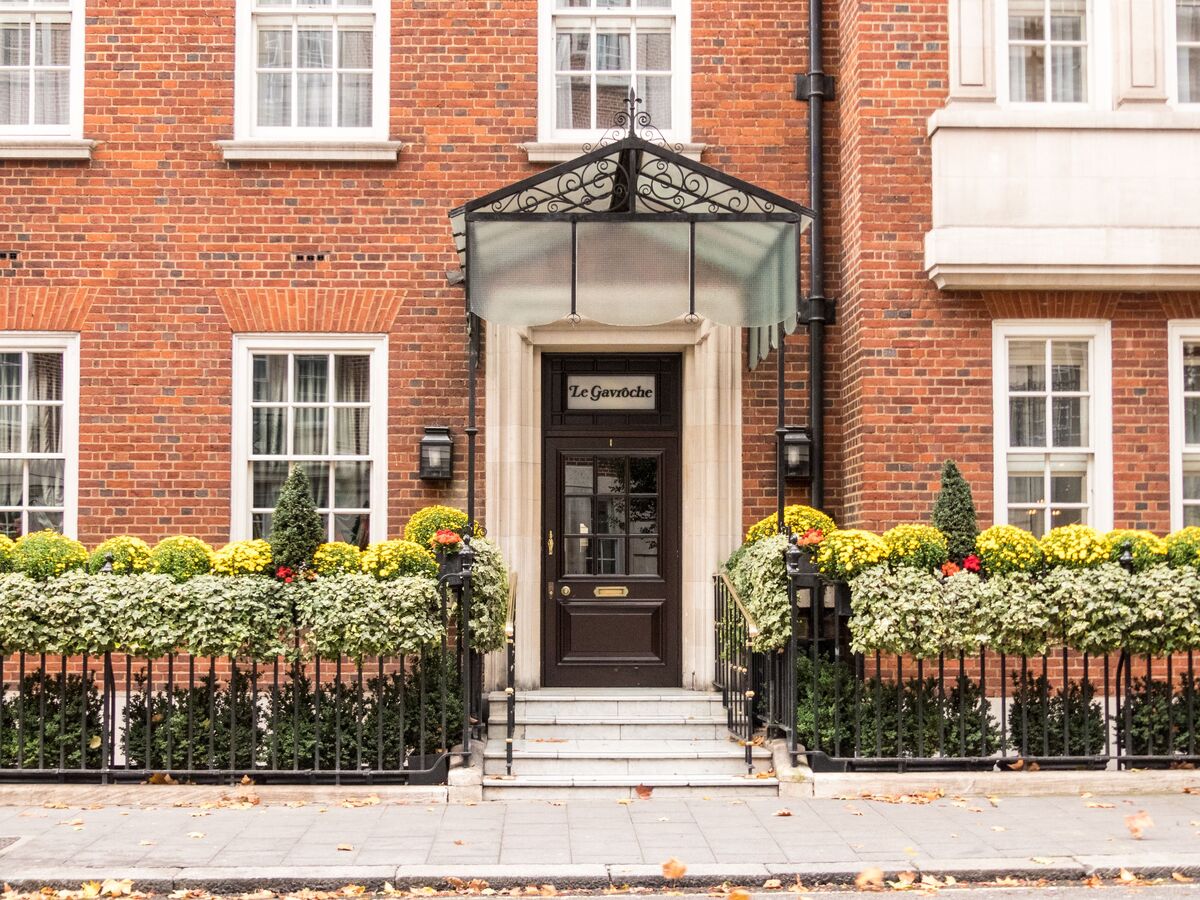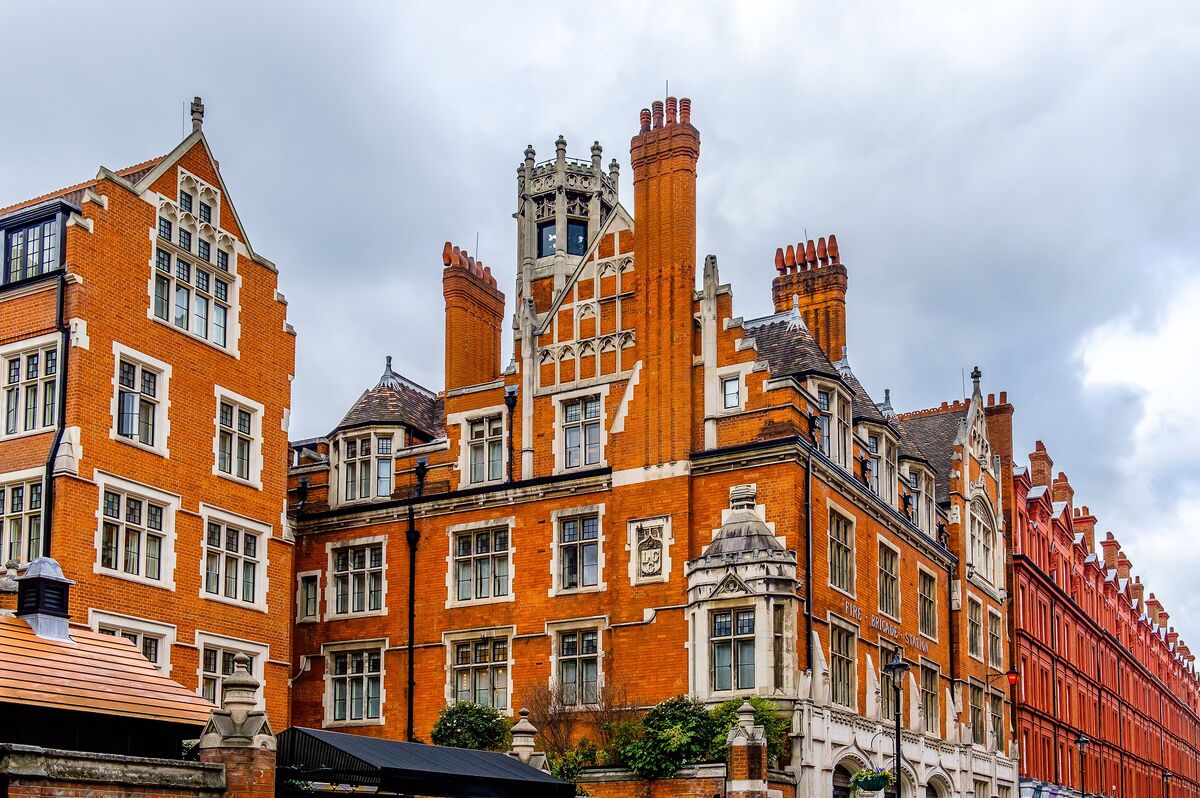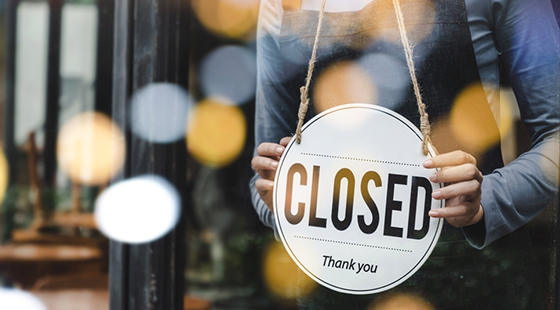Laying down the law: Bengali street food evangelist and owner of Mowgli restaurants Nisha Katona on how her family recipes are currying favour
After leaving a flourishing career as a barrister to spread the word about Bengali cuisine, Nisha Katona has defied the naysayers by opening seven Mowgli sites, with plans for more in the pipeline. She tells James Stagg how she's managed to maintain control of every element of the business
Having to master all elements of a business will be a story familiar to most independent operators. But Mowgli founder Nisha Katona has turned it into a matter of personal pride that, despite the rapid growth of her concept, she has sole control over all aspects of the operation.
Prior to opening the first Mowgli site in Bold Street, Liverpool, in October 2014, Katona was a child protection barrister for 20 years. So it was some career change to give it all up to open a restaurant and share her love of the light and flavoursome Indian cuisine that's been handed down through her family for generations.
Now running seven sites, with plenty more in the pipeline, and an MBE for services to the food industry in the New Year's Honours 2019, her desire to spread what she describes as her addiction to the food of her ancestors has not waned.
"My whole philosophy is that I'm addicted to this food and I want to create dishes with addictive flavours," Katona explains. "I want people to come back two or three times a week. People literally come for lunch and then come back for dinner."
Making conversation To create this kind of loyalty, Katona has not only developed a product with a relatively low price point, but is also open, honest and willing to engage with potential guests and other operators alike. She's also been single-minded in making it a success, in the beginning by being a barrister by day and building the Bold Street restaurant by night.
"Opening the first site meant we were going to have to sell the house and move into my auntie's bungalow," Katona says. "It was crazy. So I did both jobs, though everyone said I should abandon the restaurant. It just kept me awake at night until it was born. It was ridiculous. It became all-consuming.
"Prior to the idea, I took no advice, but since then I've been shameless. The restaurant world really is a fraternity. I would literally knock on doors and say 'is the owner here?' and ask to have a coffee with them. I would speak to anyone who would speak to me."
That approach has extended to social media too, a medium through which Katona still maintains absolute control. If you're engaging with Mowgli, you're engaging with her.
"Everything to do with Mowgli was built in collaboration with social media. For instance, I put out there that I was thinking of giving up the bar and putting these dishes on a menu in Bold Street," she says. "And slowly people started to follow. They chose the name Mowgli. And from the inception people owned it and were invested in it in some way, so they came to see what it was about. It was amazing. Four years on, and the queues haven't stopped. But I don't take it for granted for one minute, as you really are only as good as your product."
Katona says the last thing she would let go of as the business grows is the marketing voice and PR. "Every word on social media is me. It's great and it means that I am aware every single time a bad curry is served. I need that and it's right that it happens. You get into a dialogue with the guests and then they become proprietorial. This is the grit of the business. I'm only as good as their last mouthful."
Curry favour
From the beginning, the idea was to create an accessible environment to showcase the largely healthy, predominantly vegan Bengali menu that's a far cry from the ubiquitous curry house offering. Katona designed the decor for the first site and retains the same control over all new locations.
"I'll never have designers in," she says. "I think that if we can't take Indian food out of the building and put a coffee shop in the next day then my design is wrong. I want it to be neutral so that expectations are neutralised."
Katona was looking for the food to shine, but she didn't take anything for granted, hiring teenagers to sit in nearby restaurants and count diners, record the demographic and see what people were eating and drinking. But she still couldn't be absolutely sure that her family's recipes would be a hit in the mass market.
"All I've done is reproduce the dishes I make at home. If you go to my mum's or gran's, it will be the same food, apart from the odd errant dish," she says. These dishes include the taste explosions that are yogurt chat bombs (crisp bread puffs filled with chickpeas, spiced yogurt and tamarind that are consumed in one intense bite), green ginger and rhubarb dahl, and the house lamb curry - described as Katona's father's recipe on the menu - which features lamb slow-cooked with anise, plums and chickpeas.
There are also cultural collisions, such as the Mowgli chip butty, Himalayan cheese on toast (Cheddar with a coriander, red onion and green chilli dressing) and gunpowder chicken - a dish inspired by Katona's daughter's love of KFC popcorn chicken, but in this incarnation combined with ginger, garlic, garam masala and fried chickpea batter.
"Indians love to adulterate English food," Katona says. "At home we'd never have chips without putting turmeric on them, which adds to their depth and earthiness. If we ever got chips from the chippy, my mum would get a roti and add the chips along with a green chilli pickle with mustard, red onion and coriander - so I thought, let's try it on the menu."
Katona opened the first site just as the dirty burger craze hit Liverpool, so despite her confidence in the dishes, she was still uncertain how curries cooked without any ghee or cream would be received.
"All I know is I just had to put these dishes on the menu. It wasn't consciously vegan or vegetarian - these are just my desert island dishes," she explains. "It was terrifying because at the heart of our menu is a cold vegan starter [the yogurt chat bombs, made with soy yogurt], which can be quite challenging if what you're coming in for is a korma and a naan bread. So it was a bit of a risk. It's amazing that it's popular.
"The biggest questions people have are, 'do you do korma?' and 'why don't you have poppadoms?'. It's an Indian kitchen, I'm from Bengal and these are the food tastes of my ancestors. My father was a Hindu priest and there were strict rules about food, where garlic, onion and meat are almost forbidden, so I've a section on the menu called the Hindu Kitchen, where it's pretty much free of those things. It means that when people come for lunch they can have light food."
The lighter focus of the menu, with fewer meat dishes, also means the business is better able to weather the current spike in food prices too, as well as being able to satisfy both vegan and meat eaters alike.
"In the beginning I worked backwards in terms of food costs, using a margin app," Katona says. "We're using lentils, which means you can pass on savings to the customers. Lamb chops will cost, obviously. But the lower price point encourages students and teenagers. They're getting the chip butty or chaat bombs, which are completely vegan, and they're getting addicted to these dishes."
Staff of life
With such fixed ideas about the preparation of the food, perhaps it's no surprise that the menus are consistent and locked down across the estate, with all chefs trained personally by Katona. They all benefit from her enthusiasm and commitment, as well as her approachable way with people.
"I'm passionate about my HR philosophy and the overarching tenets of how we deal with staff and keep them - I will never lose that," she confirms. "I want people to feel fulfilled, that their work is purposeful and that they're nourished. They are young, some of them are having a shit time at home and I want work to be a place of solace and nourishment."
Part of that nourishment for some star performers has been a trip to a Mowgli Trust-sponsored village in India to contribute to a female entrepreneurship program and work on land management projects. It's all part of Katona's wider brief to do good work, which has also included raising £116,000 towards Liverpool's first dedicated cancer hospital.
"I see my staff as my children, so I want to send them off to do something worthy. I don't want to send them to Las Vegas or Ibiza - I want them to have real, fulfilling experiences. I want those going to India to see a different way of life," Katona explains.
"It's not necessarily learning to be hospitable, it's learning to be a better person. The more you love humans, the more you come alive and want to help people. My philosophy is to get my teams to love humans and life more. Better service will just flow from that."
Leaps and bounds
The whole package of happy staff, accessible decor and menu and "addictive" food - combined with Katona's hunger to share her family's dishes far and wide - has led to the swift growth of the business. After bedding in the Bold Street site, Katona opened a site in Manchester a year later, in October 2015, a second in Liverpool in 2016 and three last year in Birmingham, Nottingham and Oxford. So far, this year, a second Manchester site has opened at University Green, while Sheffield is scheduled to open next month and Cardiff later in the year.
"We're growing at about four or five a year at the moment and I think we can keep up with that," Katona says. "I'd love one in every main city. As a barrister you are on a leash, you can only go as far as your client's instructions, and that's how I feel about Mowgli. You can only go where people want you. I get tweets from all over - Edinburgh, Glasgow, Newcastle and Bristol are bellowing for us. That's where we'll go as the demand is there."
Katona also has plans to spread further south, with Coventry, Cambridge, Bath and Brighton all on her hit list. Site decisions are informed both by social media sentiment and Katona's own research. She claims to know within "two or three buildings" of where she wants to be in Bristol and Leeds. "I don't want to land grab. I don't have that confidence yet."
This rapid growth has been facilitated in part by a £3.45m investment from the Foresight Group, a deal that included the appointment of Café Rouge founder Karen Jones as chair. It has paid dividends for Katona, both financially and in emotional support.
"I bounce everything off Karen," Katona confirms. "There is an abundance of emotion that she brings. Commercially, she is the dog's, but on top of that are these layers of emotion and affection - all things that I want to flow through my business.
"What's interesting about having a chair like Karen Jones is that it's important she is a woman with the same pressures as me. I have two teenage girls and a dependent mother. I'm getting paid less now than when I was a barrister. So I don't know what life is going to look like in the future. I'm not sure I want it to go at a frightening speed of growth."
That said, there's no doubt Katona has grand ambitions for the business. She admits to studying "the brands that have marched into eternity", such as Nando's, PizzaExpress and McDonald's, and wants guests to have the same affinity to Mowgli: "What they all have in common is a dish that everyone returns to."
To ensure that happens, Katona has no intention of ceding any control, no matter how large the group grows: "Because I'm new to business, you look at the brands that fail and you never know when that's going to be you. But I have to hold my nerve, and that can be hard when you see what's going on around you. What I've done from day one is to do this in a way that, if one of us disappears, there's someone to take on the role. I don't see it as work. What would I do on a yacht?"
Mowgli Street Food facts
Turnover £10.3m
Employees 274
Sample dishes ⢠Mowgli chip butty - roti wrap, fenugreek-kissed turmeric fries, chilli pickle, red onion, coriander, green chilli and Mowgli tomato relish (£6.95)
- Angry Bird - succulent chicken thighs marinated and roasted in tandoor spices, yogurt, ginger and garlic, served with popped mustard Mowgli Slaw (£6.95)
- Holy Chow - spiced chickpea, potato, spinach, fresh ginger and mango served in a loaf (£8.95)
- Temple Dahl - red lentils simmered with toasted cumin, coriander and lemon (£4.50)
- Mother Butter Chicken - tandoori chicken pieces simmered in a rich, sweet, spiced tomato and yogurt sauce, finished with a gloss of butter (£7.95)
- House Lamb Curry - long simmered with anise, plums and chickpeas (£7.25)
- Gulab Jamun - syrupped milk dough balls served warm with ice-cream (£4.50)
Mowgli Street Food sites
Liverpool, Bold Street Opened October 2014
Covers 62
Manchester, Corn Exchange Opened October 2015
Covers 182
Liverpool, Water Street Opened December 2016
Covers 152
Grand Central Birmingham Opened October 2018
Covers 150
Oxford, Westgate Opened March 2018
Covers 110
Nottingham, Hockley Opened July 2018
Covers 90
Manchester, University Green Opened January 2019
Covers 120
Sheffield, Ecclesall Road Opening April 2019
Cardiff, Church Street Opening 2019
Hospitality might have a reasonable gender balance as a sector, but Katona is acutely aware that there are few women at founder level.
This, she says, has made it harder to blaze a trail in business since there are too few role models to emulate and call on for advice. "I know why - it's because of the risk that goes hand in hand with it," she explains. "And it's the language. Women don't talk the language of ambition, profit and growth. Unless you belong to the business world, where it's encouraged to think like that, it's difficult. Women don't speak enough about things like that."
She is keen to lay bare her own travails, so that others can learn from both her successes and mistakes. "I know what the challenges are and that's why I'm so keen to talk about it," she adds. "And why on social media I'm disinhibited about the peaks and the troughs.
"People need to see what the landscape in business is like. If you don't come from business, you don't come with entrenched ideas - and we need creative innocence. I will cock up. I'll talk about when it's going well, but also when it's not going so well. These things happen for a reason and you learn."
Katona admits that she found the change from employee to employer tricky at first, with few role models to look too.
"I originally thought I didn't want to do it, as I couldn't see any women with the responsibilities I have who had done it. We are equal in our home as parents, but I still remain the first point of call for our children. As a woman those pressures are just different. When I started this, it was the women around me who were saying it would destroy my family. There was no such indictment from the men."



